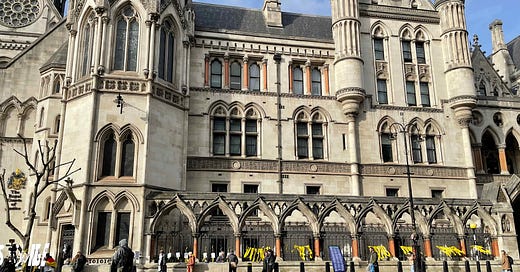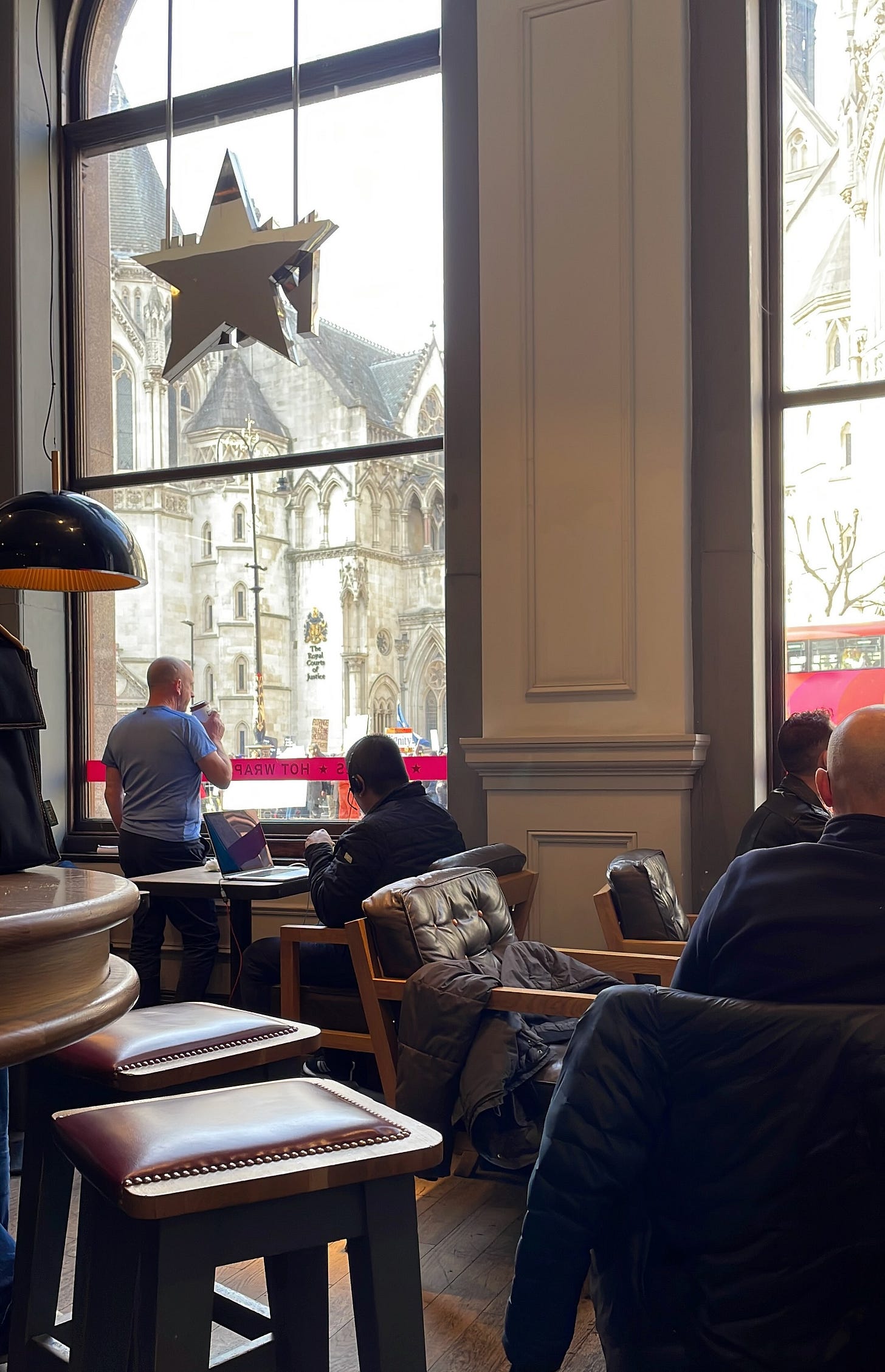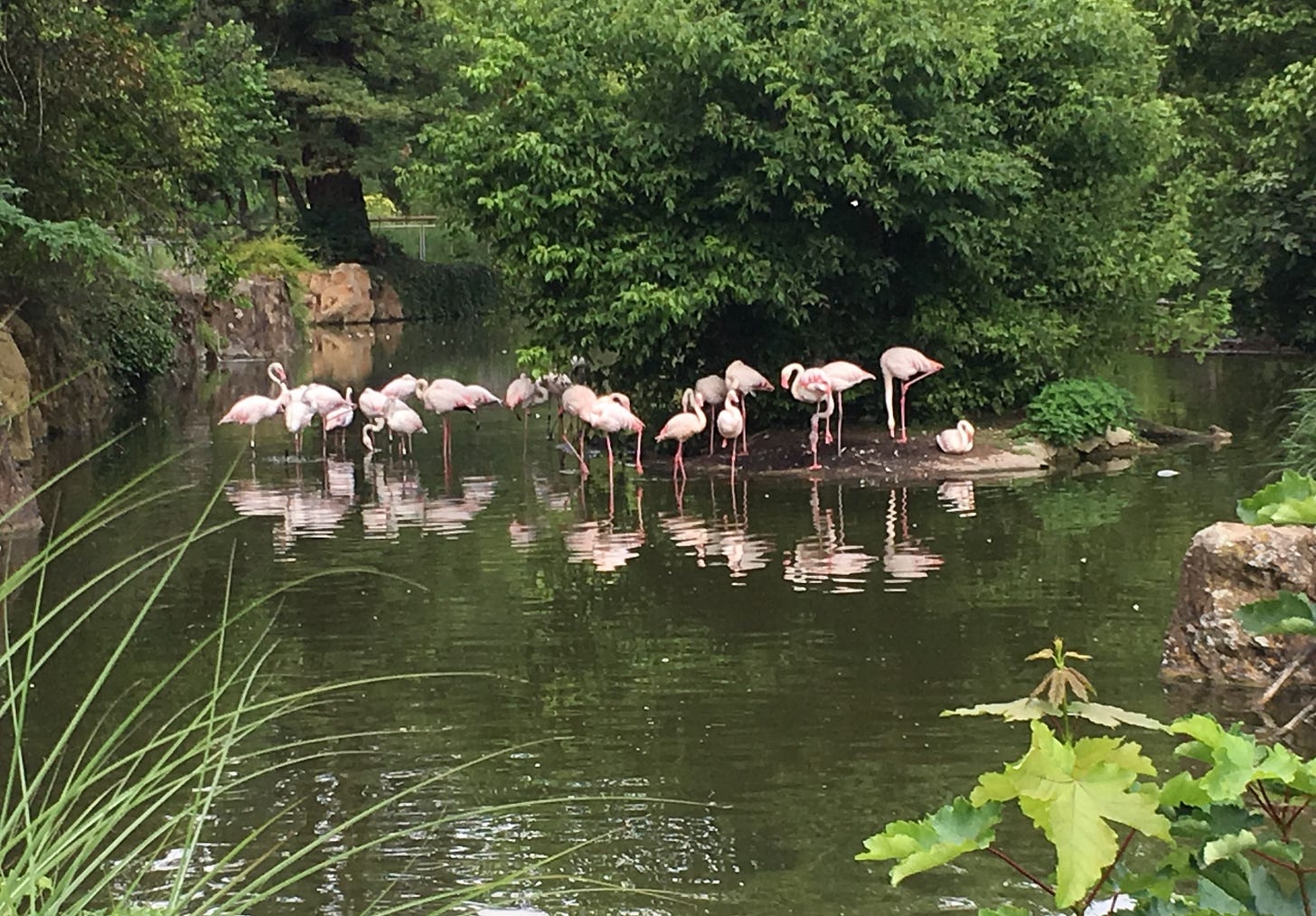Last week I had a cup of tea in a cafe across the street from the Royal Courts of Justice in London. It happened to be the first afternoon of the two-day extradition hearing for Julian Assange1. Supporters and media packed the sidewalks waving placards and banners, while microphones and cameras were recording everything. It was an energetic crowd, and as far as I could see, very well-behaved.
The first thing that caught my attention was the row of yellow fluttering ribbons tied to the fence across the street. My feet were aching from having walked for miles already, and I spotted a cafe across the street, so in I went. I managed to find a spot near an outlet (a highly desirable location) and with a partial view out the window to the crowd gathered across the street.
I rested my feet, enjoyed my mint tea and watched the circus, all at the same time. Around me in the cafe were journalists, with their laptop screens streaming news outlets from around the world, and multiple plugged-in video cameras and laptops strewn carelessly on tables and chairs. Cables weaved like a ropes course around the room.
We were all paying attention both to what was happening across the street as well as what was streaming on our devices. The journalists were speaking quietly into microphones with headphones attached; otherwise, the headphones were slung around their necks while chatting with their colleagues, or reading the news bulletins. It is not unusual in London to be in a cafe where the languages spoken are not English, but this was yet another indication that this was a news story with heightened international interest.
Every so often a wave of quiet would blow across the room as if everyone breathed in as one: a ripple, a wave, a current felt but unseen. There were glances across the room, a nod of heads, and we would all look outside.
Across the street in front of the entrance to the Courts were the supporters with posters, banners, and various decorations. Numerous television cameras pointed at well-groomed reporters standing with their backs to the Court, creating a well-designed photogenic background of the colourful crowds and the majestic court buildings. Big puff-ball microphones on long sticks hovered above the crowded heads.
One young man rode up on his folding bicycle, and stopped in the midst of many reporters. He pulled a small camera out of his backpack and attached it to a selfie stick, which in turn he attached to the now parked bicycle, using it as a tripod stand. He aimed the camera at the crowd, and then went around to stand facing the camera. He spoke for a few moments. Afterwards he walked back to the camera, looked through the viewfinder again, decided that whatever he had filmed was sufficient. In less than another minute, he had unscrewed his tripod, camera and selfie stick, tucked the kit into his backpack, and rode away.
When they weren’t actively on camera or interviewing people, the outside reporters were typing into their tablets, possibly their notes for the on-camera intros and other live segments to come. It was still an hour before anyone could be expected to come out, so, unlike the reporter-cyclist, there was relaxed milling about but no one left. Whenever someone did come out of the Court building, the crowd would lean forward, the boom microphones would point towards the front, and a slight hush would blow across the masses. The banners and placards would still, all heads looking towards the speaker podium.
Meantime, there was a constant stream of tourist buses, delivery vans, and general city traffic flowing past the Courts in both directions as the business of a large capital city continued it’s own work, oblivious to the activity at the Court.
The crowds ebbed and flowed, although there was a steady presence in the two mid-afternoon hours I was there. By the time I was ready to go, more people were arriving. An end of the day statement was expected, and it was time for the live evening news reports.
I don’t know about y’all, but I have a love/ hate relationship with the news right now. I want to know what is ‘going on’ but when I do listen or read, I am left feeling less good about our lives, more frustrated, angry, or sometimes even underwhelmed. Really, is that it? Is that our world?
My whole life I have been someone who generally kept apprised of local, national and international events. I am not the most studied, or knowledgeable, but I try to have at least a passing familiarity of significant events and trends. These days, however, I am finding a desire to be more like an ostrich. I can’t quite ostrich fully yet, my old habits aren’t gone, but I am finding myself much more selective about the time I spend on “news’ and where I allocate my time.
A few days ago, however, I was watching the series 1971: The Year Music Changed Everything, based on the book by British music journalist, David Hepworth2: 1971: Never a Dull Moment. I watched an episode that contained scenes from the Attica, New York prison uprising in 19713. The retaking of the Attica Prison was the biggest state-sponsored killing of our own citizens since the battle at Wounded Knee, and the Civil War.
One scene showed a national news reporter outside the prison, just barely able to talk from his overwhelm, and on the verge of tears at the scene he was reporting. These events are horrific for the reporters trying to convey what is happening, to us safely behind our screens and another level removed from the event itself. But they are right there, shocked and horrified at what is happening, yet have to digest, process, and convey details, meaning and context, on the spot with clarity and dispassion.
I think back to the reporters who patiently waited to relay the outcome of the hearings in London, and all of those who summarise daily events and try to give us context and meaning. While I know last week’s hearing wasn’t the violent drama of other current, past, and likely future events, nonetheless, I am grateful for their skills and their time to let us know what took place and why we should care. I wish all the reporters grace for the emotional toll that some of this reporting may take on their psyche. And I thank them for being next to the front line for us.
I am reminded that what they do keeps me tethered to my fellow humans and hopefully, prevents me from being an ostrich when I really do need to pay attention.
Thank you once again for joining me here!
Do you like to follow the news? How do you like to take in your news? Do you have one or two reliable sources, or do you have many? Do you focus on local, national or international news, or all of it?
I’d love to hear any other thoughts you have about the news. It seems to have become a particularly fraught topic the last few years, so I’m always interested in how people manage the flood of information we have access to.
See you next week, and meantime, hope you see the right amount of sun, and wishing all good health.
xoxo Sabrina
If you know anyone who might like to read these posts, feel free to send this one their way. Just click this button here:
And if you aren’t subscribing already, here’s the button for doing that (it’s free!):
If you liked reading this, feel free to click the ❤️ button on this post so more people can discover it on Substack 🙏
https://en.wikipedia.org/wiki/Julian_Assange
https://en.wikipedia.org/wiki/David_Hepworth#Publications; http://davidhepworth.com/
https://www.britannica.com/topic/Attica-prison-revolt; https://www.npr.org/2021/10/27/1049295683/attica-prison-documentary-stanley-nelson









Boy, do I know this one. I force myself to listen to the news and read the newspaper. Otherwise, I’d spend all my educational time listening to writing podcasts, TED talks, Fresh Air, Modern Love, Sanjay Gupta’s Chasing Life, or Anderson Cooper’s Is That All There Is. Though the latter is far from cheery.
Like you, I want to be well informed and know what’s going on in the world. But so many terrible things are happening now that I can’t bear it. I haven’t been able to listen to a word of the new nuclear arms race in space. Everything is too scary now.
I can only listen to the news when I’m working out — steer all that stress and strength into managing the news — and sweating out the bad news.
I also think a lot about our children and the direction of this country and the world. Makes me sad and worried. I’d rather be an ostrich too but that would be more harmful. I have to take my news in small and measured amounts.
I keep up with news, mainly through online news sites & podcasts. I have a natural interest in geopolitical...stuff?...and topics that I follow, so it's not a chore to me. I try to get different perspectives, so I'll read or listen to views of events from different political viewpoints and from different countries. I think its just an extension of loving history-- I want to know the history I'm living through.
I know many people prefer to focus on what is local & in front of them, which is also admirable, honestly, and probably gives them more hours & peace in their days.